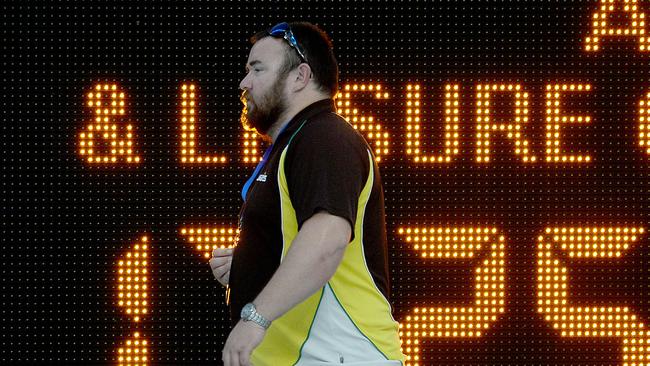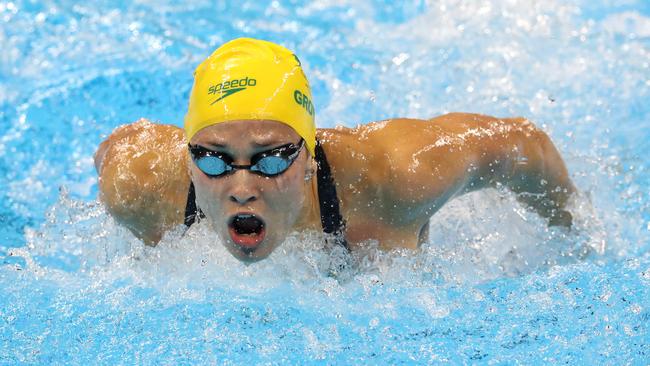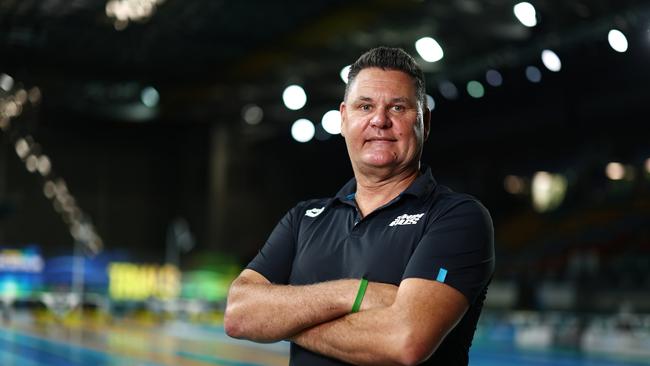Olympics 2024: How past claims could hinder Australia’s gold medal hopes in the pool
Swimming Australia is standing by its controversial decision to select an all-male coaching team for the Paris Olympics, despite murmurs their choice of trainers could lead to some awkward moments on the pool deck.
Swimming
Don't miss out on the headlines from Swimming. Followed categories will be added to My News.
Swimming Australia is standing by its controversial decision to select an all-male coaching team for the Paris Olympics, despite murmurs that their choice of trainers could lead to some awkward moments on the pool deck.
While each of the eight male coaches who were picked for the Olympics meet SA’s strict requirements for selection, uncomfortable questions are being asked about the reappointment of Mick Palfrey and how he’ll get along with his fellow coach Tim Lane.
A long-time mentor of some of the country’s fastest swimmers, Palfrey has previously been accused by three female swimmers, and a senior coach, of inappropriate behaviour.
Palfrey has always strongly denied all accusations of misconduct and has never been charged with any offences. This masthead reached out to Palfrey for comment.
In 2014, he was investigated by swimming authorities following separate complaints by two teenage girls in Western Australia.
Lane wrote a two-page letter at the time, saying he witnessed Palfrey “affectionately touch and rub the neck and shoulders of female athletes”.
The complaints against Palfrey were all dismissed.
Both Lane and Palfrey have been selected as coaches for Paris, prompting speculation from the sport’s insiders that there could be some uneasiness.

Seven years later, in 2021, Rio Olympic silver medallist Maddie Groves alleged that Palfrey had mistreated her when she was a teenager and he was her coach.
In an interview with the ABC, Groves alleged that Palfrey often made sexist remarks about her, controlled what she ate and left her with bruises after ‘manhandling her.’ Palfrey denies the claims.
SA referred the matter to Sport Integrity Australia (SIA), which was powerless to act, so the matter was closed.
“SIA was aware of the concerns in the media but did not receive a complaint and therefore did not undertake an investigation into the named person – noting that SIA would not have had the jurisdiction to investigate a complaint at the time because of the time the alleged conduct occurred which was prior to the implementation of the National Integrity Framework,” SIA told this masthead.
SA told this masthead it had conducted background checks on all the coaches that were chosen for next month’s Olympics and was satisfied everyone deserved their chance to be included.
“Ahead of coaching appointments for Paris 2024, all coaches were vetted and cleared by Swimming Australia Integrity to confirm their accreditation status and good standing, and independent government agency Sports Integrity Australia has not advised us of any complaints,” SA said.
“Therefore, to our knowledge, there are no outstanding or current allegations against our coaching appointments, and should anyone have knowledge of conduct that is putting our athletes at risk – we ask you to come forward and inform the relevant bodies – either us at Swimming Australia, Sports Integrity Australia and in matters of criminal nature – the police.”

Criticised in the past for operating like a boy’s club, SA has made great strides in recent years in promoting women to key positions within the organisation.
SA has also taken a much stronger stance to safeguard female participants after ordering an independent investigation in 2021 into claims of toxic culture in elite swimming.
While SA kept the most scathing revelations from the report under wraps before the public learnt about them from a leaked report, SA’s leaders did agree to implement a wide range of recommendations to protect female participants, including a promise to select women coaches on national teams after a 20-year absence.
SA has partly honoured that pledge, selecting two female coaches on the four-member open-water team for Paris, but still none for the 41-strong squad for the pool events, though swimming is hardly alone.
Women are grossly under-represented in Australian sports, with less than 10% of funded high performance sports led by women head coaches, prompting the Australian Institute of Sport (AIS) to take the lead in pushing for change.
“The AIS is working to address the sector wide issue of low female representation in high performance coaching roles,” said Michelle De Highden from the AIS Coach Development team
“With the likes of Bec Rippon (Water Polo), Sandy Brondello (Basketball) and Katrina Powell (Hockey) leading national teams, and sports like Athletics and Rowing increasing the number of women on their coaching staff, we are confident that Paris 2024 will be a step in the right direction as we seek to have more women in these critical roles.”

While Australia boasts some of the best swimming coaches in the world, the job is not an easy one because it comes with high pressure and responsibility.
The hours are long, no-one’s getting rich, and the only time they really get noticed is when things go wrong.
It’s little wonder then that the numbers are starting to decline with even the best coaches reconsidering whether it’s all worth it, with master coach Michael Bohl recently revealing he’s taking at least a year off and Dean Boxall also understood to be taking an extended break after Paris.
National head coach Rohan Taylor, who has helped transform the Dolphins into one of the most formidable swim teams on the planet, said the complexity of high-performance sport meant that the true intentions of coaches were often misconstrued.
“We recognise that it is a brutal role because these are very empathetic people who give a lot of themselves to help people achieve their goals,” he said.
“And sometimes we’ll do it at the expense of our own wellbeing and that’s a real dangerous, slippery slope.
“It’s a pressure you put on yourself. They’re like the athletes, they’ve got higher levels of expectation on themselves than anyone else can put on them.
“The thing that really challenges coaches and any human being is when you’re misunderstood. Their intent is pure. They want to help these athletes get the best out of themselves and they go about it in their unique way.”




